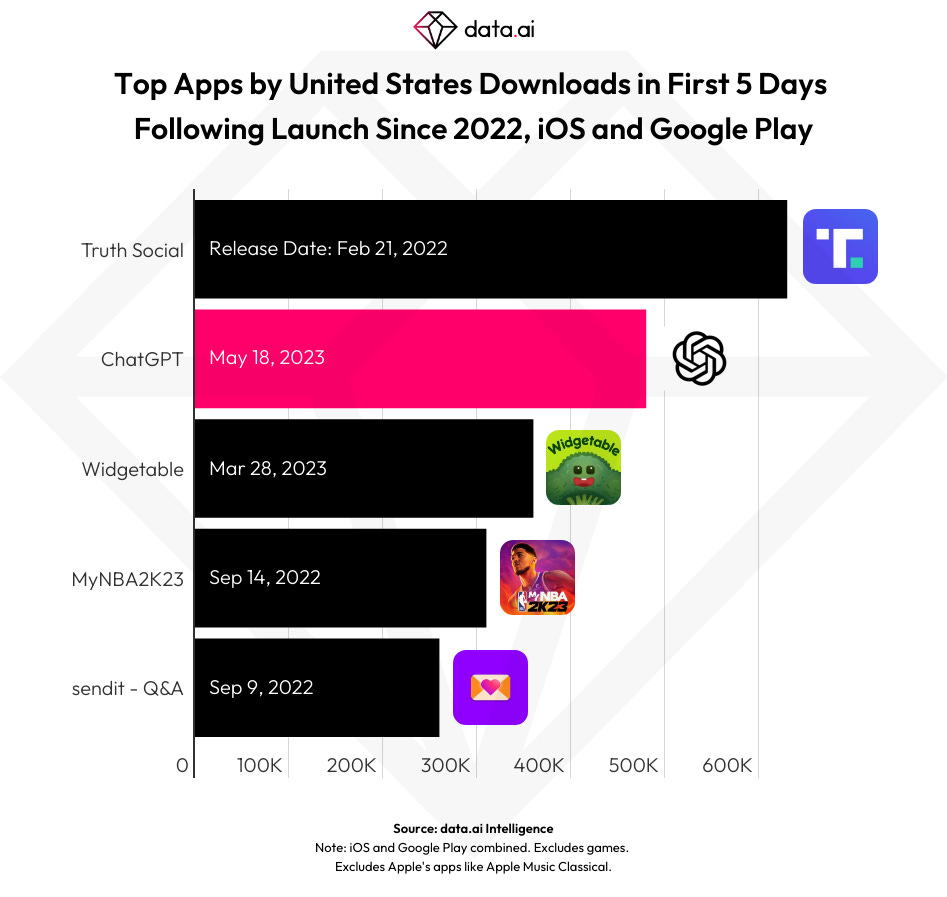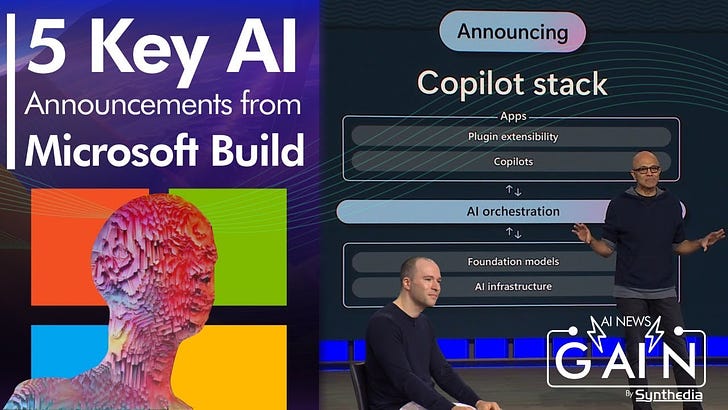ChatGPT App Analysis - 500k Downloads, 45 Countries, and Taking on GPT-Powered Apps
11 of the top 40 productivity apps are ChatGPT-style apps today
TLDR;
ChatGPT’s iOS app is now in more than 40 countries
The app is #1 in productivity in the U.S. apps store
Data show that it is the second most successful app since January 2022 in terms of first 5-day downloads
11 of the top 40 productivity apps in the App Store are generative AI chat apps and at least nine of them are using OpenAI GPT models
What use cases could expand the mobile generative AI market beyond productivity
ChatGPT’s iOS app (see a demo here) was introduced a week ago in the U.S. This week, it rolled out to 45 more countries, including Albania, Algeria, Argentina, Azerbaijan, Bolivia, Brazil, Canada, Chile, Costa Rica, Croatia, Ecuador, Estonia, France, Germany, Ghana, India, Iraq, Ireland, Israel, Jamaica, Japan, Jordan, Kazakhstan, Kuwait, Lebanon, Lithuania, Mauritania, Mauritius, Mexico, Morocco, Namibia, Nauru, New Zealand, Nicaragua, Nigeria, Oman, Pakistan, Peru, Poland, Qatar, Slovenia, South Korea, Tunisia, the United Arab Emirates, and the United Kingdom.
It is worth noting that EU countries France, Germany, and Poland are included in the release. Google Bard became generally available a couple of weeks ago in 180 countries but has, so far, avoided EU nations. This is presumably due to regulatory compliance concerns.
OpenAI was asked by Italian regulators earlier this year to stop operating its browser-based application until it could show compliance with local regulations. This was followed by inquiries, but not actions, from several other EU nations. The ChatGPT iOS app is not yet available in Italy, but the browser app was reintroduced to Italy late last month.
There is still no Android app for ChatGPT, but Open AI indicated that it is coming soon. The lack of an Android app may be the only thing keeping OpenAI from setting several mobile app adoption records right now. And we have some data on that front below.
#1 in Productivity
Interest in ChatGPT continues to be strong. It ranked #1 in the U.S. iOS App Store for productivity apps and #3 for top free apps. In addition, Data.ai reported that the ChatGPT iOS app surpassed 500,000 downloads in its first six days. The app was second only to Donald Trump’s February 2022 launch of the social network Truth Social over the past 18 months for “first 5-days” download total. Those figures account for both iOS and Android, and ChatGPT is currently iOS only.
TechCrunch also broke out an analysis for the best 5-day download periods for the Bing search and Edge browser apps on iOS since they both implemented OpenAI’s GPT-4 technology. The ChatGPT app far outpaced both in the “Best 5 Day Period” download activity.
ChatStorm in the App Stores
However, Microsoft and OpenAI are far from the only generative AI chat options for mobile. Nine of the top 25 iOS productivity apps today and 11 of the top 40 are chatbot assistants. Synthedia has confirmed that nine of the 11 apps use OpenAI GPT technology, and it might be 10.
Only one app, c.ai (Character AI), has confirmed it does not use OpenAI generative AI models. Most of the others use their reliance on OpenAI technology as a selling point in their app description. Many also call out ChatGPT in their short app descriptions.
In the chart above, the chat apps with red outlines have confirmed the use of GPT-3, 3.5, 3.5 -turbo, or 4. The green outline indicates it uses another model, and the yellow is unconfirmed.
OpenAI’s permissive API access and slow entry into mobile apps created a window of opportunity for third-party apps. They were able to fulfill market demand for ChatGPT-style features in a mobile-native experience using the same technology that drives the mothership.
It is unclear how the arrival of OpenAI’s official ChatGPT app will impact their prospects for future growth. Some may be able to differentiate their offerings by targeting niche user groups or features. Still, it will be hard to compete as a generalist with ChatGPT given its broad awareness and 100 million monthly active users on desktop.
Will Poe Be Around Evermore
Poe could be an interesting standout in this group. It was created by Quora, the crowdsourced Q&A knowledge base. Poe offers access to the same models used by ChatGPT as well as to Anthropic’s Claude and plans to add more options in the future. So, it has a diversity of AI model capabilities which may be important at some point. Quora also has a large user base to market to, high consumer awareness, and unique information assets.
It will be interesting to see if Quroa can use Poe as the foundation for a new social knowledge network combining human expertise with generative AI resources and connecting people around topics and interests. Generative AI apps today are one-to-one activities. Poe will be uniquely interesting if Quora can figure out an effective way to transform some of those experiences into many-to-many social graph engagements.
Will “Chat with Ask AI” be Toppled?
The app Chat with Ask AI is currently well ahead of ChatGPT in terms of mobile users. It has 106,000 reviews and an average rating of 4.8 in the App Store. It is also available on Android with 333,000 reviews and a 4.6 rating. Chat with Ask AI launched in April, and its combined best 5-day App Store and Google Play downloads were about 100,000 more than ChatGPT’s iOS launch.
In its marketing, the app stresses a variety of use cases beyond questions, email writing, and search. For example, Chat with Ask AI highlights “texting tips for relationships,” “get help with school work,” and “practice any language.”
If Chat with Ask AI can keep a significant portion of current users and double down on customization for lifestyle activities, the app may carve out a differentiated and desirable market position. It seems clear that ChatGPT will remain a general-purpose tool. Even if ChatGPT can serve similar user needs, chat experiences tailored to specific user types and use cases may be preferred by users.
Productivity and Social Experiences
ChatGPT-style experiences are clearly desirable for productivity tasks. A big question will be if the same generative AI capabilities become widely adopted for entertainment and companionship.
Character AI is fulfilling entertainment and productivity use cases today and could expand into companionship. SK Telecom’s A. (pronounced “A - dot”) landed one million users for its beta release. It is a generative AI based chat companion that has productivity features but leads with companionship and entertainment (If you want to hear more about A., you can listen to my interview with the product manager starting at 20:10 in this episode of the Voicebot Podcast recorded at Mobile World Congress 2023).
Four key takeaways from tracking consumer behavior so far in 2023 around generative AI chat apps:
They are popular.
OpenAI provides the AI models that power nearly all of the popular apps.
Existing apps that rely on ChatGPT technology may struggle to compete going forward unless they follow a path to specialization and customization.
Productivity use cases lead today, but entertainment and companionship could significantly increase the market size and also increase daily usage.
What do you think? What apps will succeed in the space? Can any compete long-term with ChatGPT head-to-head? Please add a comment below.









